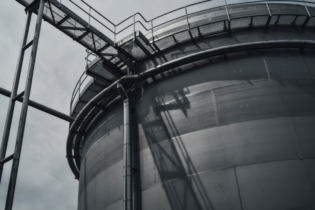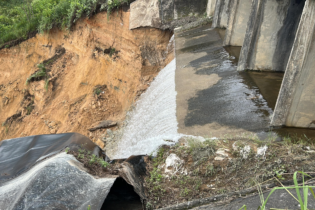The Makhado and Vhembe municipalities are being dragged into court after failing to provide the people of Makhado (formerly known as Louis Trichardt) with sufficient water as required by law.
AfriForum is finalising legal papers to force the local government to make good after what has literally been months of failed service provision. “I am busy with the papers right now,” says AfriForum legal spokesman, Willie Spies, in Pretoria. “We are aiming at issuing and serving the papers this week. It will be an application to compel the municipality to deliver the basic requirements.” Spies says national standards for water supply dictate that municipalities must provide a minimum of 25 litres of water a day to individuals, or six kilolitres a month for households. “The basic requirements are not being met, and that’s why we’re going to ask the court for an order to compel the municipality to do that. It is hard to establish why this isn’t being done. We received a long-winded letter from the Makhado municipality, but it is more or less a blame game. They (the Makhado municipality) are blaming the district municipality of Vhembe.” AfriForum is hauling both municipalities to court to apply pressure to get these local governments to do their jobs in terms of basic service provision. DA ward councillor in Makhado, Brian du Plooy, says the nub of the water crisis is the inability of the Makhado and Vhembe municipalities to work together. “The problem is that you have municipalities that are the water consumers and other municipalities that are water providers. This creates massive issues because the two municipalities don’t work together. There’s so much political fighting between the two municipalities.” In this case, the Makhado municipality consumes the water, which is provided by the Vhembe district municipality. “Vhembe bills the municipality every month for the water, but because of the incapability of officials, they cannot sustain the service provision.”Du Plooy says the Vhembe District Municipality, which is situated some 80km from Makhado, is unaccountable, incompetent and unresponsive. The result of this is that locals can go without water for days, sometimes weeks. “When there are breakdowns, it takes 48 to 72 hours before they even appoint a service provider to look into the situation, because they don’t have competent people or sufficient people to do their work.” It is a legacy problem which has been caused, in part, by the failure to maintain infrastructure. Added pressure is brought to bear by a growing community with a resultant increased demand for water. “The whole system has been dilapidated and you are not going to sort that situation overnight. You can promise people whatever you want, but the system has not been maintained for the last 15 to 20 years. It is just poor management from the municipality’s side,” says du Plooy. Louis Bobodi, spokesperson for the Makhado government, agrees that the problem is a combination of “ageing infrastructure” and demand versus capacity. “We are currently drilling six boreholes in town (and) refurbishing the existing pipeline system from (the) Albasini Dam to (the) Mouwkop Reservoir in town.” Bobodi adds that a tender has been advertised by the Vhembe district municipality for the construction of a pipeline to transport the water the 27.9 km distance between the dam and the reservoir. But there’s no timeline for when this will be done.
Asked about the feud between the two municipalities and whether this has added to Makhado’s water service delivery woes, Bobodi says, “We are not aware of the feud.” A spokesperson from the Vhembe district municipality was asked for comment, but didn’t respond by the time Daily Maverick was about to be published. While the new boreholes sound like a good solution, they’re also fraught because of the deteriorating infrastructure. The Makhado sewerage system also hasn’t been maintained and, as a result, effluents have been flowing out into vleis, dams and the veld area for years, according to du Plooy, who says that the water crisis has a knock-on effect. “If there isn’t enough water, well, then you have other problems, like that of sewerage, blockages and that sort of thing, which means that effluence pours out and creates what is potentially a major health hazard.” Du Plooy says local kids play in the dams and the vleis or in water pools without knowing that they’re actually in water that is contaminated. “We have a sewerage pump station that stopped functioning weeks ago. The water is pouring out next door into the vlei and there’s a dam there. We’ve reported it but five weeks later, nobody has been out there to fix it. There’s been a problem with sewerage flowing into that area for the last seven years.” A local construction company has been appointed to construct a new sewerage plant, but the completion of this is at least a year off. “For years now you’ve had raw sewerage flowing into veld and vlei areas, and it is definitely having an effect on everybody. The big problem is that the sewerage runs past boreholes that service the people with water.”
Of late, the situation is particularly debilitating for people living in Tshikota Township, who have been without water for weeks. Local newspaper the Zoutpansberger reports that desperate community members broke open a fire hydrant. “We are suffering! We don’t know what else to do,” residents told journalist Isabel Venter.
Tshikota residents could only get water from the fire hydrant, or a local school which has a borehole. The cost for the water at the school is a rand a litre, which makes bathing, washing clothes or flushing a toilet prohibitively expensive. The irony is that while residents suffer in some parts of Makhado, leaks in other parts of the town see valuable water being lost because repairs are not done, or aren’t attended to for weeks. Public meetings have been held and promises have been made, but still the Makhado area struggles in the face of disrupted or non-existent water supply. AfriForum’s Spies says that legal pressure might bring some relief. “What we are hoping that the municipality will be brought to book with pressure or a sanction of some kind.” Spies, who has fought similar cases in the Free State, says that legal action creates a basis for engaging intransigent municipalities. Makhado is just one of many local municipalities where the law is being used in an effort to ensure the right to water is realised. At the beginning of July this year, the Legal Resources Centre and the Lawyers for Human Rights united to bring about a high court ruling to compel the Gert Sibande Municipality in Mpumalanga to deliver clean, drinkable water to residents of Silobela, Caropark and Carolina. To date, however, the municipality is still in defiance of that ruling. In the Eastern Cape, at the beginning of August, a Port Elizabeth woman laid the blame for the death of her young daughter at the local government’s door. The toddler drowned in a bucket of water after taps in the city had run dry. In Gunjaneni and Tholokuhle, two rural villages situated close to Jacob Zuma’s homestead of Nkandla, the locals have to use the same water source as livestock. While Nkandla is due for a R2 billion upgrade, the people of Gunjaneni and Tholokuhle are apparently doomed to drink dirty water from a nearby dam, which exposes them to the risk of cholera and other diseases. A recent report by the African Centre for Water Research shows the problem with water insecurity and provision is widespread, and that there’s a direct correlation between water scarcity and social unrest.“When government has not met expectations, citizens have responded by blaming government structures for non-delivery of services,” the report reads. The survey states that the response from government to these protests is often disengagement. Or, as is the case in Makhado, local officials play the blame game or shift responsibility. The research shows this merely results in a cycle of growing frustrations and an eventual disrespect for the law on the part of the public.The ancient Chinese philosopher Laozi is believed to have said that in this world, there is nothing more submissive and weak than water. Yet for attacking that which is hard and strong, nothing can surpass it. As South Africa’s water wars intensify, local government and the ruling party may find that their hardest attack comes from those without water. It could be the very failure to provide water that could create a tipping point that emboldens people to demand better government, and pushes civic action to the courts to ensure basic service provision. It could be the provision of water that threatens ANC rule.
Back in Makhado, some people are still without water, and have been dry for close on a week. “Makhado extension nine hasn’t had a single drop of water since Sunday. They said there was a problem with the valve, they opened the valve last night and this morning there still wasn’t any water,” says the DA’s Du Plooy. Source: allAfrica.com






